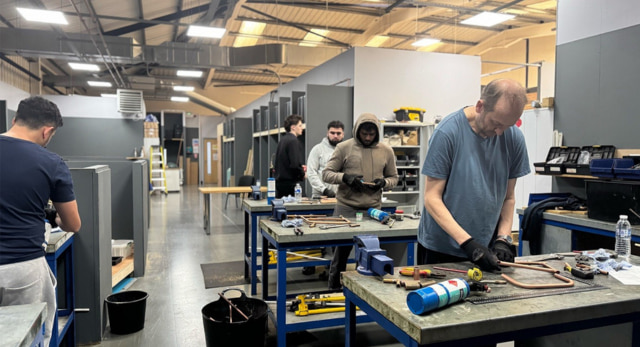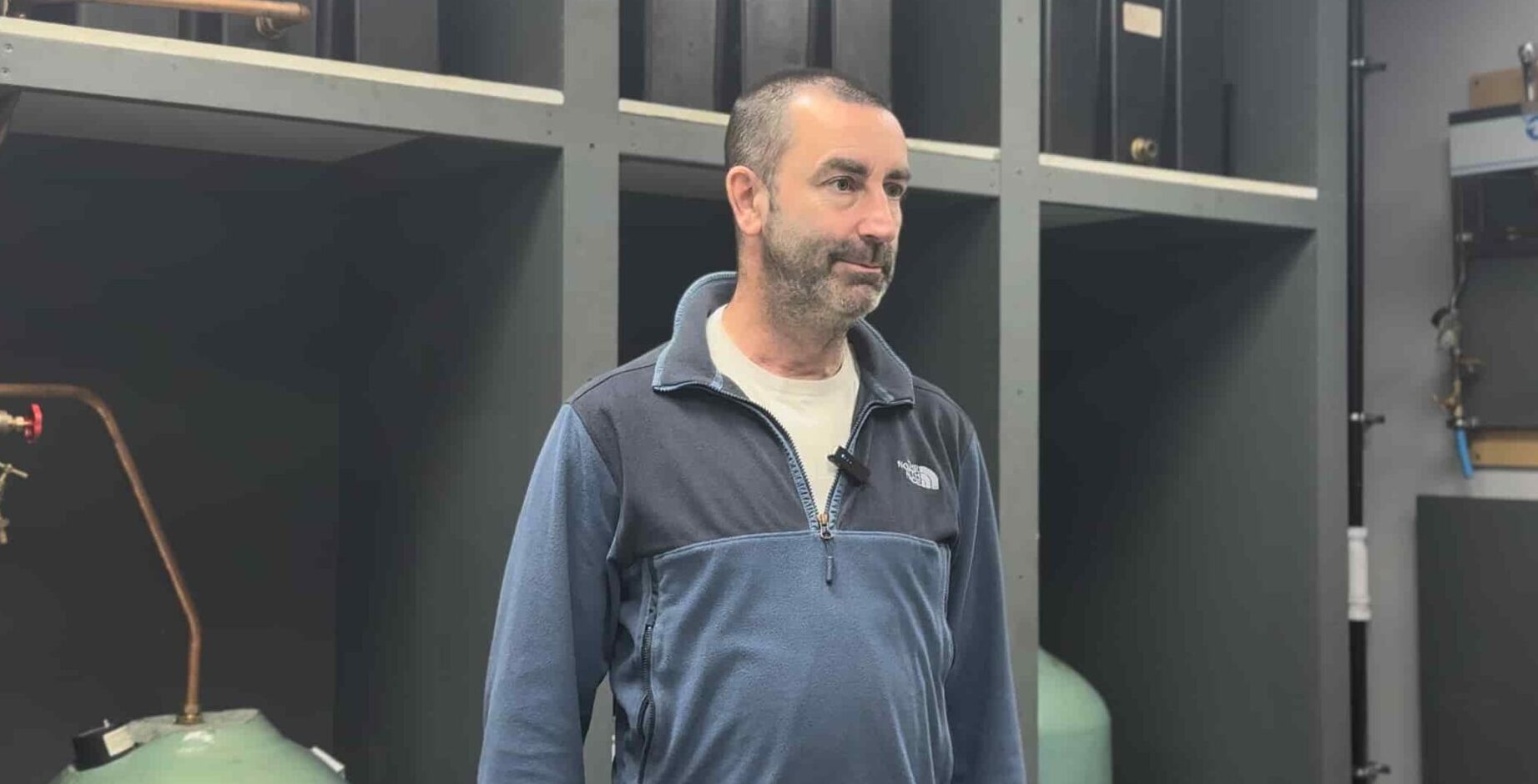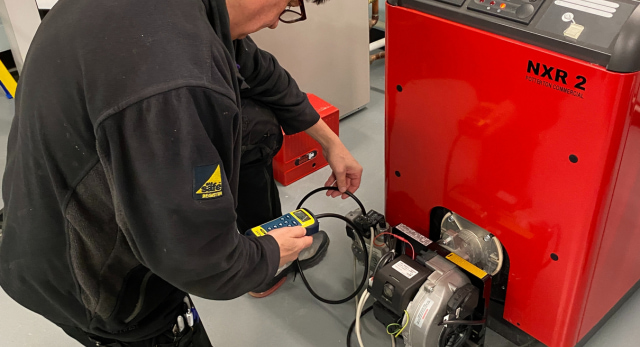Thinking about a career in the skilled trades but unsure what’s holding you back? You’re not alone. Understanding the barriers to entering the trades is the first step to overcoming them. Whether it’s financial worries, lack of information, or simply not knowing where to start, this article will break down the most common obstacles and show you how to get started in a rewarding skilled trades career in the UK.

Why the UK Needs More Skilled Tradespeople
The UK is facing a construction and building services crunch. A national shortage of skilled tradespeople like plumbers, electricians, carpenters, and heating engineers is set to cost the economy a staggering £98 billion in missed growth by 2030. As the government pushes for net zero and embarks on ambitious housebuilding targets, the demand for skilled labour is outstripping supply at a record pace.
- By 2030, the UK could be short by 250,000 tradespeople.
- Nearly 100,000 fewer construction workers were in the sector in September 2024 than five years earlier, due to Brexit, pandemic impacts, and an ageing workforce.
- One in five Brits has already had to cancel or postpone home improvement projects due to a lack of available professionals.
The skills gap isn’t just an economic headache. It’s a golden ticket for anyone looking to start or switch to a skilled trades career in the UK.
The Current Skills Shortage: Key Stats
The UK’s skilled trades sector is facing a crisis of supply and demand, with the scale and complexity of the shortage now impacting every corner of the construction and building services industry. Here’s a detailed look at the numbers and the underlying issues driving this critical gap.
Shortfall: National and Sector-Wide Demand
The UK is currently short by around 166,000 skilled tradespeople, but this figure only scratches the surface. Over the next decade, the sector will need to recruit a staggering 1.3 million new skilled workers and 350,000 apprentices to meet government targets for housing, infrastructure, and net zero. If current trends continue, the shortfall is forecast to rise to at least 250,000 by 2030, threatening to undermine national ambitions for new homes, greener buildings, and modernised infrastructure.
Regional Impact: Where the Gaps Are Deepest
While the shortage is nationwide, some regions are feeling the pinch more than others. The East and West Midlands are the hardest hit, each facing deficits exceeding 35,000 tradespeople. These shortages have a direct economic impact, with billions in lost GDP growth and stalled projects. Other regions, including London and the South East, are also experiencing acute shortages, putting further pressure on wages and project delivery times.
Vacancy Rates: Trades Most in Demand
Vacancy rates for skilled trades are at record highs, with certain roles in especially urgent demand. According to the UK Trade Skills Index, over 100,000 new electricians will be needed by 2032, making this the single most in-demand trade. Plumbers, heating installers, bricklayers, and carpenters are also seeing soaring vacancy rates, fuelled by a combination of rising demand, an ageing workforce, and the post-Brexit exodus of EU workers. The home improvement and repair sector alone is forecast to grow by 40% over the next decade, further intensifying the need for qualified tradespeople.
Demographics: An Ageing Workforce and a Thin Pipeline
One of the most pressing issues is the age profile of the current workforce. More than a third of all skilled tradespeople are now over 50, and many are planning to retire within the next decade. To simply replace those leaving, the sector will need to recruit at least 377,000 new workers. However, the pipeline of young people entering the trades is worryingly thin, with too few apprentices and new starters to fill the gap. This demographic time bomb means the skills shortage is set to get worse before it gets better.
Diversity: The Gender Gap and Untapped Potential
The gender imbalance in the trades remains stark: just 2% of skilled tradespeople are women, making this the most male-dominated industry in the UK. This figure has barely shifted in two decades, despite growing awareness and targeted recruitment drives. Closing this gap isn’t just a matter of fairness—doubling the number of women in trades could add up to £800 million to the UK economy every year. Other underrepresented groups, including ethnic minorities and disabled people, also remain a largely untapped source of talent.
In Summary
- Urgent national shortfall: 1.3 million new skilled workers and 350,000 apprentices needed over the next decade.
- Regional hotspots: Midlands hardest hit, but shortages are UK-wide.
- Record vacancies: Electricians, plumbers, and heating engineers in highest demand.
- Ageing workforce: Over a third are 50+, with mass retirements looming.
- Diversity deficit: Only 2% of tradespeople are women, with huge economic upside if this changes.
The scale of the skills shortage is both a challenge and an unprecedented opportunity for anyone considering a skilled trades career in the UK. With that said, it is coming up to a crucial time for the trades as the demand is ever-increasing, whilst the skill gap is only growing. Learn more about the Building Services Skill Gap and how we can tackle it.
Common Barriers to Joining the Trades
Despite the clear need, many people still hesitate. Let’s break down the real barriers to entering the trades.
Financial Concerns
The Issue: Training for a skilled trade can seem expensive. Apprenticeships may pay less than your current job. Tools, travel, and certification costs add up.
Reality Check:
- Apprenticeships for 16–18-year-olds are often fully funded, with adults getting up to 95% of training costs covered.
- Grants and bursaries are available, especially for underrepresented groups.
- Many providers, including Logic4training, offer flexible payment plans and advice on accessing funding.
Lack of Information and Awareness
The Issue: Trade careers are rarely promoted in schools. Only 13% of 16–25s say they were encouraged to consider a trade. Over half of young people report never being given information about skilled trades at school.
Reality Check:
- Misinformation persists: trades are often seen as “low-skilled” or a “last resort,” when in fact they require technical expertise and offer high earning potential.
- There’s a need for more visible role models and better careers advice.
Age and Career Change Worries
The Issue: Many adults worry they’re “too old” to start again, or that employers only want young apprentices.
Reality Check:
- The sector desperately needs mature entrants, especially as older workers retire in droves.
- Life experience, reliability, and transferable skills are valued.
- Flexible and part-time training options make it possible to retrain while working or managing family commitments.
Gender Stereotypes and Diversity Issues
The Issue: Trades have long been male-dominated, with women making up just 2% of the workforce. Stereotypes and a lack of visible female mentors can put women off.
Reality Check:
- The industry is changing: there’s a big push to recruit more women and people from diverse backgrounds.
- Employers are increasingly offering mentoring, flexible hours, and supportive environments.
- Doubling the number of women in trades could add £800m to the UK economy each year.
Qualifications and Entry Requirements
The Issue: Confusion about what qualifications are needed, and whether foreign qualifications are recognised, can be a major barrier, especially for migrant workers.
Reality Check:
- Most trades have clear, accessible routes, including apprenticeships, fast-track courses, and on-the-job learning.
- Migrant workers often face hurdles with qualification recognition and may need to retrain or “top up” their skills to UK standards.
- Support is available for English language training and navigating the certification process.
Finding the Right Training Provider
The Issue: With so many options, it’s hard to know who to trust.
Reality Check:
- Look for accredited, reputable providers with a track record of supporting learners from all backgrounds, like Logic4training.
- Check for flexible delivery, strong employer links, and good student support.
The Barriers Checklist
The Barriers Checklist
Assessing Your Readiness
Identifying Your Personal Roadblocks
-
Financial: Do you need help with course fees, travel, or tools?
-
Time: Can you fit training around work or family?
-
Confidence: Are you worried about being "too old" or "too inexperienced"?
-
Support: Do you have access to advice, mentors, or peer networks?
-
Language/Cultural: Do you need help with English or understanding UK workplace culture?
-
Qualification Recognition: Do your existing qualifications need to be assessed or topped up?
Solutions and Support for Overcoming Barriers
There’s no one-size-fits-all fix, but plenty of support is out there.
Funding and Grants
- Apprenticeships: Up to 100% funded for 16–18s, 95% for adults, plus extra support for those with additional needs.
- Levy Transfers: Small businesses can access unused apprenticeship levy funds from larger employers.
- Grants: Targeted grants are available for women, disabled learners, and those from underrepresented groups.
Flexible Training Options
- Flexi-job Apprenticeships: Complete shorter placements across multiple employers—ideal for construction and creative industries.
- Part-time and Modular Courses: Evening, weekend, and blended learning options make it easier to fit training around your life.
- Online Resources: Access learning materials, revision guides, and support from anywhere.
Support for Underrepresented Groups
Breaking into the trades can be especially challenging for those from underrepresented backgrounds. However, a growing network of initiatives, funding, and community support is helping to level the playing field and create real opportunities for everyone. Here’s a closer look at how the industry is supporting women, career changers, migrant workers, and those at risk of exploitation.
- Women in Trades
For decades, the skilled trades have been male-dominated, but this is changing thanks to targeted support and a shift in industry culture. Women now have access to:- Peer Mentorship and Networking: Programmes like the Women in Skilled Trades Peer Mentorship Group offer monthly sessions where women can connect with experienced tradeswomen, share experiences, and find encouragement. These groups provide safe, inclusive spaces for women at any stage of their career, helping to build confidence and professional networks.
- Industry Initiatives: Many employers are actively seeking to diversify their teams, offering mentoring, flexible hours, and tailored support to attract and retain women.
- Visibility and Advocacy: Regular keynote speakers, industry events, and campaigns are raising the profile of women in trades, helping to challenge stereotypes and inspire the next generation.
- Career Changers
Mature entrants and those seeking a career change often bring valuable skills from previous roles but may need extra support to navigate the transition:- Tailored Advice: Many training providers, including Logic4training, offer personalised guidance to help career changers identify transferable skills and select the most suitable training routes.
- Flexible Pathways: Flexible apprenticeships and modular courses allow adults to retrain while working or managing family commitments, making the transition more accessible.
- Professional Accreditation: Short-term placements and flexi-job apprenticeships enable career changers to gain hands-on experience across different sectors, boosting employability and confidence.
- Migrant Workers
Migrant workers are vital to the UK’s construction and building services sector, but often face unique hurdles:- English Language Support: Language barriers can impact site safety, productivity, and integration. Many firms and colleges now offer English language (TEFL) courses specifically for immigrant workers, improving communication and reducing workplace accidents.
- Qualification Recognition: Support is available to help migrant workers have their existing qualifications assessed and recognised, or to identify any additional UK-specific training required.
- Cultural Integration: Community programmes and workplace initiatives help migrant workers adapt to UK workplace culture, ensuring they feel included and valued.
- Legal and Welfare Support
Workers from underrepresented groups are statistically more likely to experience low pay, insecure work, or even exploitation. Ensuring fair treatment and access to justice is essential:- Rights Awareness: Charities and advocacy groups provide free advice on employment rights, helping workers understand their entitlements around pay, conditions, and safety.
- Casework and Representation: Support is available for those facing unfair treatment, including help with securing unpaid wages, challenging exploitative practices, and mediation or tribunal representation.
- Strategic Advocacy: Organisations also work to influence policy and improve the enforcement of rights, ensuring long-term change for all workers.
- Community and Funding Initiatives
- Targeted Funding: Programmes like the Community Matters Fund offer grants to support skills development, work placements, and employability training for young people, ethnic minorities, those with health conditions or disabilities, ex-offenders, and returners to work.
- Diversity Projects: National and local initiatives, such as the government’s ‘5 Cities Project’, are driving up apprenticeship uptake among Black, Asian, and Minority Ethnic (BAME) groups and people from disadvantaged backgrounds, with support from major employers and community organisations.
In summary, support for underrepresented groups in the trades is stronger than ever, with mentoring, tailored training, language support, and legal guidance all helping to break down barriers. These initiatives not only benefit individuals but also strengthen the industry by tapping into a wider pool of talent and experience.

How Logic4training Can Help
Logic4training is committed to breaking down barriers and supporting new entrants at every stage:
- Wide Range of Courses: Gas, Electrical, Plumbing, Renewables, and more.
- Flexible Learning: Evening, weekend, and blended options.
- Funding Advice: Help finding grants, bursaries, and payment plans.
- Expert Tutors: Industry professionals with real-world experience.
- Supportive Environment: Guidance from your first enquiry to your first job.
Explore our career change to construction blog for more inspiration.
Taking the Next Steps
1. Choosing the Right Course
- Research the different trades and qualifications.
- Make sure the training provider offers courses that involve in-centre learning and training.
- Be extremely cautious of online courses and their structure. Learn more here.
- For specific information you might be looking for, speak to course advisors. You can call our course advisors at 020 8845 7222.
2. Get in Touch with Logic4training
- Call: 020 8845 7222
- Email: [email protected]
- Visit our get in touch page
3. Complete Your Training
Start your training course to enter into a new industry or upskill within your current trade.
Conclusion
Don’t Let Barriers Hold You Back
The barriers to entering the trades are real, but they’re not insurmountable. The sector needs you regardless of your age, background, or previous experience. With skills shortages at a record high, there’s never been a better time to get started. The future of UK construction and building services depends on new talent stepping up.
Download our checklist, explore your options, and get in touch with Logic4training. Your future in the skilled trades starts now.
FAQ
What are the main barriers to entering the trades in the UK?
Financial concerns, lack of information, age worries, gender stereotypes, qualification confusion, language barriers for migrants, and finding the right training provider are the most common barriers.
Is funding available for trade training courses?
Yes. Apprenticeships are up to 100% funded for 16–18s and 95% for adults. There are also grants and levy transfers for SMEs.
Am I too old to start a skilled trades career?
No! Mature entrants are highly valued, especially as the current workforce ages and retires. Flexible training options make it easier to retrain at any age.
Are the trades open to women?
Absolutely. The number of women in trades is rising, and there’s strong support for female apprentices and professionals. Doubling the number of women in trades could add £800m to the economy each year.
How do I choose the right training provider?
Look for an accredited provider with flexible options, strong industry links, and good student support, like Logic4training.
I have qualifications from abroad, will they be recognised?
It depends. Some foreign qualifications may need to be assessed or supplemented with UK certification. Support is available to help you navigate this.
Where can I find more advice or support?
Visit the Logic4training blog for tips, guides, and the latest industry news.









